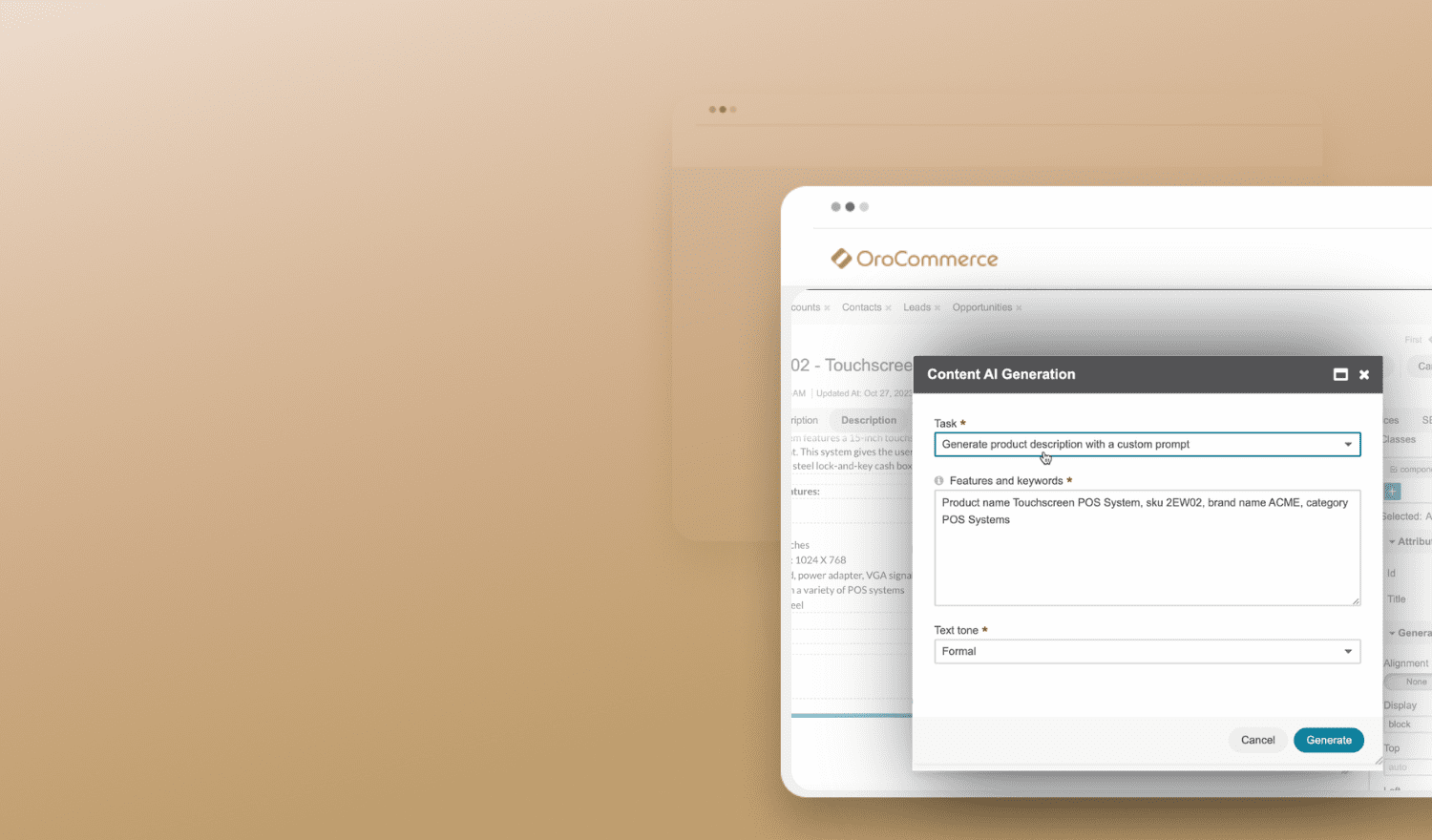What if generating quotes for your B2B customers only took seconds instead of hours or even days? What if your sales reps didn’t have to worry about the item’s availability, correct pricing, and personalized discounts when creating a quote for a given customer? In such a perfectly automated eCommerce environment, your potential buyers receive their quotes as soon as they request them, which results in uninterrupted online experience and a higher conversion rate. On a pursuit for automation in B2B eCommerce and marketplace management solution, quote management and CPQ (configure price quote) solutions should be your primary tools for driving sales efficiency, and here’s why.
Quotation management software automates the task of configuring and generating a quote for the customer. It pulls all the available product, pricing, shipping, and customer data to prepare a personalized quote based on the predefined rules. For example, a QMS may check the inventory for the specified items, factor in the customer-specific discounts and loyalty rewards, and calculate the shipping cost for the customer’s location, thus dramatically saving time on preparing the quote and eliminating manual errors.
Quoting systems, like QMS and CPQ, also streamline the approval workflows within the organization. Depending on the sales rep’s permissions, the size of the quote, or complexity of customizations within the quote, an automated quoting system may submit the generated quote for approval by a senior manager before sending it to the buyer.
Benefits of Automated Quoting Process for B2B eCommerce
Adding automated quoting capabilities to your B2B eCommerce website is a great way to maximize your sales team’s productivity while enabling customers to fully explore your offerings. In their CPQ magic quadrant for 2018, Gartner specifically indicates the importance of automated quoting capabilities for B2B sellers. Here’s how these capabilities can benefit your sales, customer acquisition, and operations.
For sales teams:
- Minimum time to prepare quotes, more time to sell
- Fast processing of customers’ RFQs to quickly get past the discovery phase and increase conversion rates
- Ability to negotiate best value via multiple quotes to encourage larger orders
- Valid inventory and pricing data, no risk of manual mistakes
- Streamlined approval process to ensure fast quotes even for complex cases
- Fast learning curve for new sales reps
- Simplified reporting and analytics
For buyers:
- Minimized RFQ waiting time leading to greater satisfaction
- Quick comparison of prices for different products, options, and configurations
- Clear total cost, including shipping, payment fees, applicable discounts, etc.
- Custom-tailored design and total cost breakdown based on the customer’s template
- Product recommendations and loyalty programs based on previously submitted RFQs
For managers:
- Complete visibility into the generated quotes and their status
- Effortless reports on buyers’ product preferences
- Analyzing and testing optimal pricing, accessories, and extra services for the product
Quote Management Flows
For the best flexibility for your business, a QMS solution should allow you to configure different workflows that correspond to your quote processing policies. The two most common workflows are simple quote submission and quote submission after approval.
In the first flow, a sales rep has all the necessary rights to create and submit a quote directly to the customer. This flow may require certain conditions, such as the seniority of the sales person within the company, simple customizations (or none at all) requested by the customer, and low to medium value of the quote.
The second flow requires getting an approval from an authorized manager before submitting a quote to the customer. It is commonly used by companies to safeguard their junior sales reps or partners from making a mistake in a customer-facing document. It is also useful for complex RFQs when validation is required not only by sales managers but also engineering or delivery departments.
Note that both types of workflows are also directly connected to eCommerce, CRM, and ERP workflows in the company. Therefore, seamless integration between your QMS/CPQ system and above mentioned solutions remains the key requirement for efficient quote automation. In such an integrated environment, the customer’s RFQ syncs directly into a QMS, populated with all the customer data from CRM and pricing/inventory/shipping data from ERP. Integration between eCommerce, CRM, and ERP processes remains the key meta-workflow for many other eCommerce operations, not only quote management.
Selection Criteria for Quote Management Solution
When selecting a quote management solution for your business, you need to consider first how it may fit into your existing application landscape. Basic quote management functionality is pretty much straightforward and well implemented by a number of solutions out there. So, check if it can be easily connected to such tools as your eCommerce platform, ERP, CRM, Business Intelligence, marketing automation, and reporting systems. All of these will most likely interact with your QMS/CPQ.
Another important selection factor is flexibility to meet your business-specific workflows and use cases. This includes configuration of user roles, approval processes, and business rules to factor in during the quote generation. You may want to ensure that a QMS system works well with multiple price lists, personalized discounts per customer, product configuration data as well as allows for custom-tailored quote design.
Reporting and analytics are also important to fully benefit from QMS/CPQ. An integrated dashboard that displays status of quotes, pending approvals, action items will help your managers to stay on top of the situation. The system can also provide more advanced analytics, such the quote-to-order rate depending on the product price and other factors.
What’s more to consider – in case you have a need in multiple applications, not just QMS – is whether to go best-of-breed or best-of-suite. Some vendors offer QMS/CPQ solutions as part of a larger stack of applications, such as eCommerce, CRM, or ERP. You may need to do extra research and crunch the numbers to figure out if it’s better to choose several well-integrated applications from a single vendor or select each one independently and integrate them afterwards.
Finally, it’s the vendor’s expertise. Quote management may have drastic differences when it comes to B2B vs B2C. You’d definitely be better off with a vendor who knows the specifics of your industry, too. And, last but not least, the vendor’s capability to implement necessary integrations and customizations will come in handy if you want go to market fast and without issues.
CPQ for B2B eCommerce
B2B customers set the bar high for quoting solutions. Their average orders are larger, and thus more complex, than in B2C and they also expect highly personalized pricing, payment, and shipping conditions. Creating unique quotes for every request like that in a manual way would be a tall order. The amount of potential configurations found in B2B eCommerce clearly calls for a quoting solution that is capable of generating fine-tuned custom quotes. This is where CPQ comes as a distinct class of quoting tools that is highly configurable to include all kinds of data, product selection rules, and business policies when generating a quote.
However, to avoid potential loopholes in CPQ eCommerce automation for B2B, it’s highly recommended that such a tool operates in full sync with either your B2B eCommerce system or your ERP/CRM stack to provide your customers with valid and consistent data. From the architectural perspective, given that your customer-facing system is your eCommerce webstore, it’s most efficient to have your eCommerce platform as a source of data for your CPQ (even if as a message bus connecting it to ERP/CRM).
For enterprise-grade applications, it’s actually the best practice for digital commerce platforms to feature a full-fledged CPQ tool. Such out-of-the-box integration averts many CPQ implementation challenges and reduces the total cost of ownership. That’s why a CPQ is actually one of the major selection criteria when making your way around your B2B eCommerce requirements.
B2B eCommerce Platform with a Built-In CPQ – OroCommerce
OroCommerce is an enterprise-grade eCommerce platform specifically designed to address B2B workflows and use cases. It comes with an out-of-the-box quote management tool that is fully integrated into the management interface, making it convenient for sales managers to access all eCommerce functions from a single place. OroCommerce also offers a built-in CRM and supports integrations with popular third-party ERP/CRM, thus establishing a fully synced application landscape for efficient quote automation.
You can see how OroCommerce can take care of your CPQ chores by requesting a free demo or setting up a discovery session with our team.



